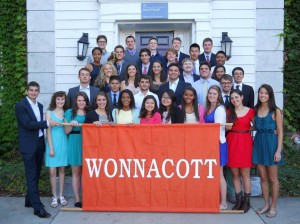If I asked a random person on the street to define success, he would most likely say that success is purely hard work. In Malcolm Gladwell’s Outliers, however Gladwell explains that success is not as straightforward as most of us think it is; in fact, the factors of success is intriguing. He used fascinating examples and reliable data to back up his theories of success.
1. Why Oppenheimer succeeded and Langan did not
Chapter 4 of Malcolm Gladwell’s Outliers compares Robert Oppenheimer to Christopher Langan to show that IQ is not relevant to success. Even though they were both undisputed geniuses, Oppenheimer succeeded and Langan did not. Gladwell arrived at this conclusion by contrasting Oppenheimer and Langan’s background. Langan was from a poor family whereas Oppenheimer was from a better-educated family and this meant that Oppenheimer had more opportunities than Langan. For example, Langan’s family was so poor that he could only go to colleges that offered him a full scholarship. Even though Langan was brilliant enough to get a scholarship, his mum forgot to fill out a financial statement in his sophomore year, which led to the cancellation of the scholarship. This meant that Langan had to go to work without graduating from university. In contrast, Oppenheimer was born into a wealthier surrounding. He went to Harvard, and then did his masters at Cambridge. Instead of doing hard labor on the weekends like Langan, Oppenheimer travelled around Europe. As a young man he had seen much more of the world compared to Langan. Oppenheimer’s advanced educational opportunities enabled him to become a top-notch scientist. He developed the atomic bomb, making significant contributions to the war effort. Gladwell explains clearly how he came up with this theory, and presented a convincing case that IQ is not the most essential factor for a person to be successful, contrary to what everyone else thinks.
2. Ethnic Theory of Plane Crashes
Gladwell investigated why Korean Air had such a high accident rate until 2000, when David Greenberg took over the operations. After careful investigation, Gladwell concluded that cultural factors contributed to communication problems in the cockpit. When Gladwell was listening to dialogues between pilots and co-pilots, he decided that the tone between them was generally indirect and uncommanding. In other words, those in a lower ranking position did not assert commands that were crucial to safety. This is due to their Korean culture, which teaches people to be more polite and give one’s utmost respect to one’s authority. This leads to statements like “I think pulling around would be a better option here” rather then “pull around here” by the co-pilot or engineer towards the pilot. Due to these indirect and ambiguous statements, there was a lot of confusion between the co-pilots and the pilots, leading to accidents. After 2000, when Korean Air hired Greenberg from America to control Korean Air’s operations, the average crash rate immediately dropped. This was because Greenberg told his pilots to use English and most importantly change their tone to a more commanding voice. Now, Korean Air is one of the safest airlines in the world. Gladwell had intriguingly explained that how the influence of the Korean culture played a significant role to the high number of plane crashes.
3. Joe Flom
To explain Flom’s success, Gladwell analyzes Flom’s background and the time period in which he was born. Gladwell investigates others who also had similar opportunities with Flom in order to explain Flom’s success. Gladwell used Alexander Bikel, as an example of how being Jewish back then was crucial. Bikel, like Flom, also wanted to be a lawyer. However, the top law firms on Wall Street rejected most Jews because the firms did not trust them. This made Bikel work at a second-rate firm, which at that time did what the big law firms did not do: mergers and acquisitions. Suddenly this business boomed and Bikel was right on top of this wave. Flom was also Jewish at that time; he took advantage of the boom in mergers and acquisitions and built a successful law firm. Gladwell also uses Maurice Janklow as an example of how being born at the right period matters. Janklow was the only one in his family who went to college then went to Law school. Afterwards, he acquired a paper printing business, which did not succeed. He had a decent family background and a good education, all the components that leads to success in business, but he couldn’t make an impact. Gladwell also investigated on Janklow’s son Mort, who became a successful lawyer. Gladwell explained that Maurice’s failure was purely because of bad timing. Maurice’s business did not succeed due to bad timing he started during the Great Depression, when the stock market and banks crashed. In contrast, Mort was born at the right time so that he had the advantage of having less people in the classroom, hence he received a better quality education; this all led to Mort building a successful law firm. Mort was born around the same years as Flom was, 1930, so Flom also had a more focused education. Gladwell examined Bikel and Janklow’s family to explain how Flom had the advantage of being Jewish and being born at the right time to build Skadden, Arps, Slate, Meagher & Flom, which was a successful law firm.
Gladwell explanations proved that the common myth, “success is just working hard”, is wrong. Gladwell brilliantly finds correlation between success and many other factors for example culture, birth period, parental background and opportunity. It is only a great thinker like Gladwell who could find out these correlations and deliver them to readers.
